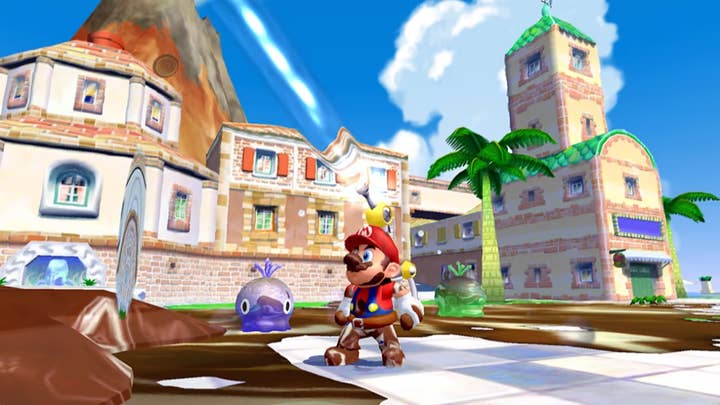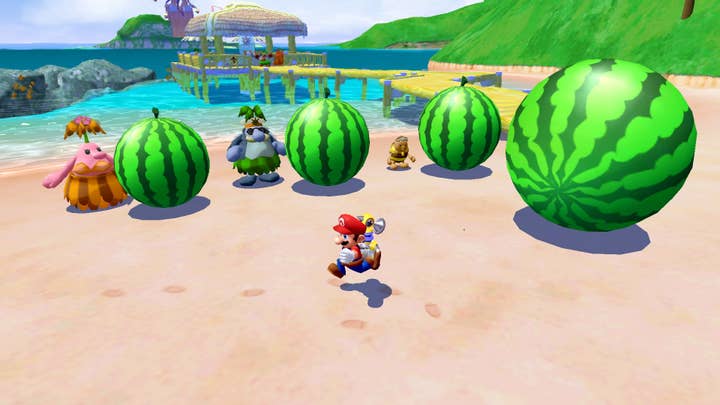Super Mario Sunshine reimagined the franchise | Why I Love
Revita developer Benjamin "BenStar" Kiefer pays tribute to the "renegade spirit" behind a divisive entry in the Mario canon
Why I Love is a series of guest editorials on GamesIndustry.biz intended to showcase the ways in which game developers appreciate each other's work. This entry was contributed by Benjamin "BenStar" Kiefer, developer of the twin-stick roguelite platformer Revita.
Super Mario Sunshine has a somewhat dubious reputation among Nintendo fans, but I can say with absolute sincerity that it's my favorite of Mario's 3D adventures. Part of this is personal bias due to the fact that it was the first video game I ever owned (I was so young that I remember being scared by the silly little mud enemies), so it imprinted itself onto me early, but it's also a game that I've revisited many times over the years and have come to appreciate more each time. As for why, there are a multitude of reasons, so let's get into it!

First off, the key to any Mario game is its movement, and I reckon Super Mario Sunshine has the best, most intuitive, and downright expressive moveset of any Mario game. The FLUDD jetpack/hose was key to this, as it offered Mario a forgiving hover ability, but it also granted him the ability to slide on his belly, blast up in the air, and sidestep. But even without the FLUDD -- which is taken away for certain classic platforming challenges -- Mario had a triple jump, spin jump, wall jump, and somersault, offering such a complete repertoire of maneuverability that it was fun to just run around on your own and scale the architecture. Not everything you could do was especially useful in attaining your overall goal of collecting shines, but this freedom of movement offered tiny joys like finding your own shortcuts. Since you had to dive back into the same stages time and time again, being able to carve your own path through these levels offered a playful sense of creativity that I found missing in more linear Mario adventures.
Where previous Mario games saw you traverse the Mushroom Kingdom across a wide array of biomes, Super Mario Sunshine dedicated itself to a single tropical motif
Perhaps Super Mario Sunshine's most divisive aspect was its devotion to one particular theme. Where previous Mario games saw you traverse the Mushroom Kingdom across a wide array of biomes, Super Mario Sunshine dedicated itself to a single tropical motif, as the whole thing was set around a vacation gone awry. While some found the beach resort limiting or same-y, I always viewed it as a plus, as I was really impressed at how much Nintendo managed to squeeze out of this one theme. It's got hotels, an industrial area, a haunted house, coral reefs, and of course, beaches. Super Mario Sunshine didn't concern itself with being a kingdom-spanning epic. Instead, it was content to be what its premise promised all along: a vacation.
Indeed Super Mario Sunshine's dedication to world building was really ambitious for its time. Prior to Sunshine, Mario games had always been based around abstractions. Stages in Super Mario 64 and his 2D titles would have vague cosmetic concepts behind them, but they largely consisted of floating platforms that didn't make any logical sense. We were largely fine with this because they were fun -- nevermind that early video games had to be abstract due to technical limitations. Super Mario Sunshine re-imagined what a 3D Mario game could be by contextualizing everything into its fiction. For example, where an early Mario game would simply give you a trampoline to bounce on, Super Mario Sunshine would give you a vendor's stall with a bouncy little tarp for its roof. It made sense for this world.
I understand that "making sense" isn't exactly a priority for many in a game about a plumber who hops into pipes to teleport around and eats magic mushrooms to grow bigger, but it was at least a new idea for Nintendo. In fact, A LOT of Super Mario Sunshine is built around new ideas. Where most Mario games since Sunshine have largely stuck to a familiar roster of legacy creatures like Goombas and Koopa Troopas, Super Mario Sunshine introduced a ton of all-new characters, like the redesigned Boos or the strange pineapple-looking people that make up the residents of this resort. It didn't concern itself with making everything "on brand" for Mario. Instead, it allowed itself to get weird and wacky. I mean, it had voice acting for Christ's sake!

Of course, not all of these oddball decisions paid off. The aforementioned voice acting wasn't necessarily a positive, but I find it charming that Nintendo was willing to at least try it. There's also a lot of questionable design decisions. For example, each stage tasks you with collecting several blue coins, but some coins are only accessible during certain missions, and it's unclear which ones offer access to which coins. Offering a simple stat when selecting a stage would have done wonders to decrease the time-wasting tedium of searching for these when you've already collected all you can in any particular event.
This is understandable though, as Super Mario Sunshine's development was famously rushed, and it's clear where they cut corners. Originally there were going to be more stages, and even a train that would take you between the different islands. Time, and possibly the tech at the time, prevented this from happening, which is a shame. (What I wouldn't give for a Director's Cut on Switch. Please Nintendo, I'm begging you, make this happen!) Still, even with these flaws, I'd rather have a wild experimental failure than something that ticks all the boxes but plays things safe.
That's why I cherish Super Mario Sunshine so much. It feels unlike every other Mario game, and I can't imagine anything like it being made today (though the New Donk City stage in Super Mario Odyssey comes closest, with its madcap insanity of having Mario run around in a metropolis of more realistically proportioned humans).
These days Mario games are as polished and fun as ever, but they lack the sheer raw imagination of Super Mario Sunshine, that renegade spirit that lets them throw everything at the walls to see what sticks. Where other Mario games were iterative, Super Mario Sunshine boldly reimagined what a Mario game could be. And for that, it holds a special place in my heart.
Developers interested in contributing their own Why I Love column are encouraged to reach out to us at news@gamesindustry.biz.